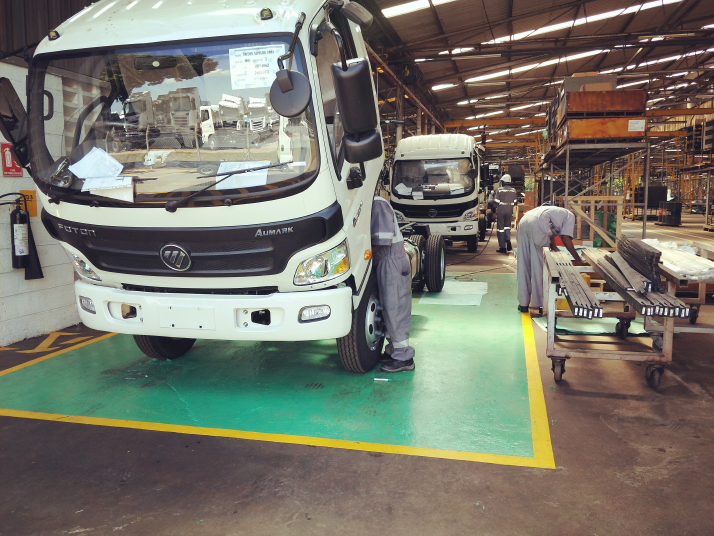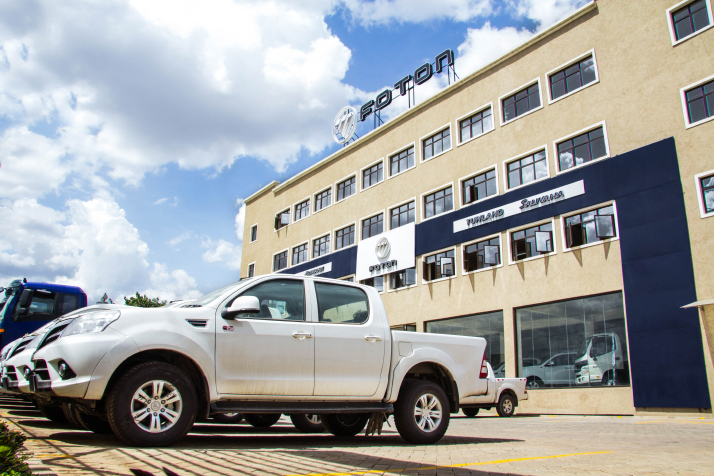|
||||||||||
| Home Nation World Business Opinion Lifestyle ChinAfrica Multimedia Columnists Documents Special Reports |
|
||||||||||
| Home Nation World Business Opinion Lifestyle ChinAfrica Multimedia Columnists Documents Special Reports |
| ChinAfrica |
| Made in Africa |
| Chinese automakers focus on manufacturing vehicles in Africa |
| By Ge Lijun | VOL.11 March ·2019-02-28 |

The Kenyan car market is attractive to foreign auto manufacturers. So attractive in fact that it has drawn the likes of leading Chinese auto company Foton Motor, who opened an operation center for East Africa on January 18 in the capital Nairobi. This center is intended to perform the various services offered by the brand and to ensure the supply of spare parts in the region. The company also deployed distributors in Rwanda, Tanzania and Uganda.
In 2006, Foton Motor was one of the first Chinese car manufacturers to operate in the African market. The company set up an assembly line in Nairobi in 2011, becoming the first Chinese car maker to do so on the African continent.
"The first few years were very difficult for us. Initially, our business model on the continent was limited only to the sale of assembled vehicles. We did not do any after-sales service, and it created a bad image," Song Yang, Vice President of Foton International told ChinAfrica. "So we must change this image if we want to continue our business in Africa."
After several years of hard work, the company has made numerous progresses in terms of manufacturing, sales, services and the provision of spare parts.
Long-term goals
Foton Motor first began to change its modus operandi in 2010, by combining manufacturing, sales and services. "Since then, the company has been developing in a sustainable way. Over the past two years, we have been focusing more specifically on trade, localization and international cooperation by building joint ventures with local companies," said Song.
During the Fourth African Investment Forum held in September 2018 in Changsha in Hunan Province, Foton Motor, the China-Africa Fund for Industrial Cooperation and the China-Africa Development Fund signed an agreement to establish an investment platform.
These national funds are the outcome of the Forum on China-African Cooperation and seek a brand-new business model with Foton Motor. As part of the Belt and Road Initiative, the three parties are accelerating investment in the African market by combining finance and the real economy.
"This is an innovation that allows manufacturing companies to globalize. This platform can promote investment and trade abroad. Initially, the investment capital amounted to $150 million," said Song.
Using this platform, Foton Motor invested in eight African countries, including Algeria, Kenya and Egypt, to create knocked down factories, sales companies, training and call centers, trading companies and spare parts companies to stimulate local economic development.
The company is now assembling vehicles at the AVA (Associated Vehicle Assemblers) plant in Miritini, west of Mombasa. The AVA is one of the three largest assembly plants in Kenya and also deals with world-renowned brands such as Toyota and Scania.
"In cooperation with the AVA plant, we are able to reduce costs while ensuring that the quality and technology remain stable," said Sun Qingzhong, Managing Director of Foton Motor Kenya.
According to Peter Munya, Cabinet Secretary in the Ministry of Industry, Trade and Cooperatives, the country's Big Four Action Plan 2022 for economic development will increase the economic contribution rate of the manufacturing sector from 9 percent to 15 percent, the auto industry being among the priority industries in Kenya. At present, Kenyan cars are highly dependent on imports with used cars represent 80 percent of the market.
"Chinese companies such as Foton Motor will significantly improve investment in the car industry in Kenya," said Munya. Since 2012, Foton Motor Kenya has invested more than $8 million in the region.
"In addition, as part of our employment strategy, we plan to hire more Kenyans, as now 70 percent of our employees are Chinese," said Sun, adding that this would include technicians, sales representatives and engineers.

Potential and competition
With the African population accounting for 15 percent of the world, the car market has great potential. According to figures from the International Organization of Motor Vehicle Manufacturers (OICA), in 2017, the volume of vehicle sales across the continent was only 1.196 million units, down 9.08 percent from the previous year, representing less than 1.5 percent of global vehicle production.
According to OICA, South Africa and Egypt are the main auto markets in Africa, with annual sales volumes of more than 200,000 units each, accompanied by sustained growth. Algeria, Morocco, Ethiopia and other countries are high potential markets. In 2017, Kenya ranked the ninth in Africa for vehicle sales.
African governments have taken measures to attract more investment in the auto industry. In 2017, Tanzania reduced taxes in the industry as a commercial incentive. The government now insists on the production of new vehicles to be manufactured locally as well as on exports to neighboring countries. A similar strategy is being implemented by Uganda, which aims to eliminate old cars, discourage their imports and support the local manufacturing sector.
As for Kenya, in 2017, the country canceled a 20-percent excise tax on locally produced vehicles. This will help car makers reduce costs and make their vehicles more competitive.
"It's a good opportunity," said Song. International car manufacturers continue to venture into the African market and are looking to take a slice of the pie. Toyota is a major investor in the manufacturing sector.
Compared to Toyota and Volkswagen, Chinese automakers are still relatively small in Africa. At the moment, Isuzu, Toyota, Nissan and Mitsubishi have established
assembly plants in Kenya. "The competitiveness of other car manufacturers is obvious. We arrived late. Our products must be able to meet local needs better, and we must guarantee good after-sales service," Song told ChinAfrica.
According to Sun, with this new strategy, the company aims to capture at least 7 percent of the Kenyan market within three years.
(Comments to glj@chinafrica.cn)
| About Us | Contact Us | Advertise with Us | Subscribe |
| Copyright Beijing Review All rights reserved 京ICP备08005356号-5 京公网安备110102005860号 |